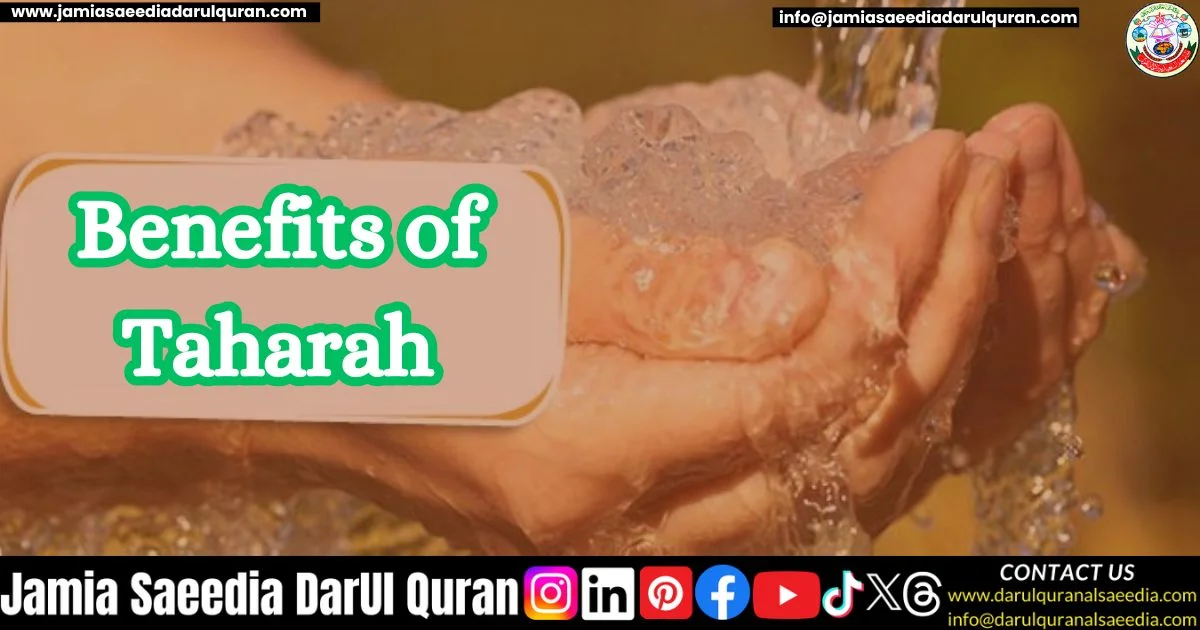Taharah, or purification, is a fundamental concept in Islam that encompasses both physical and spiritual cleanliness. It is not merely a ritual but a way of life that reflects a Muslim’s devotion to Allah (سبحانه وتعالى). This article explores Benefits of Taharah the meaning, importance, and benefits of Taharah in Islam, along with its types and practical applications in daily life.
Read More: Tajweed Institute
What is Taharah in Islam?
Taharah refers to the act of purification, which is essential for performing acts of worship Benefits of Taharah such as Salah (prayer), reading the Quran, and other religious rituals. The Prophet Muhammad (صلى الله عليه وسلم) said:
“Purification is half of faith.”
(Sahih Muslim)
This Hadith highlights the significance of Taharah in a Muslim’s life, as it is directly linked Benefits of Taharah to the completeness of one’s faith.
Importance and Benefits of Taharah in Islam
Taharah holds immense importance in Islam, both physically and spiritually. Here are some key benefits:
- Physical Cleanliness: Taharah ensures that Muslims maintain hygiene, which is crucial for health and well-being.
- Spiritual Purity: It purifies the soul, removing impurities such as sins and negative thoughts.
- Preparation for Worship: Taharah is a prerequisite for Salah, Quran recitation, and other acts of worship.
- Connection with Allah: Cleanliness is a means of drawing closer to Allah, as He loves those who purify themselves.
- Social Harmony: A clean and pure environment fosters a sense of community and respect among individuals.
Allah says in the Quran:
إِنَّ اللَّهَ يُحِبُّ التَّوَّابِينَ وَيُحِبُّ الْمُتَطَهِّرِينَ
“Indeed, Allah loves those who constantly repent and those who purify themselves.”
(Quran, Al-Baqarah 2:222)
Types of Taharah in Islam
Taharah is divided into two main types based on the nature Benefits of Taharah of impurities:
1. Taharah from External Impurities (Najasah)
This involves cleaning the body, clothes, or place of prayer from visible impurities such as blood, urine, or vomit. The process includes washing the affected area with water until the impurity is removed.
2. Taharah from Internal Impurities (Hadath)
This refers to the purification required after natural bodily functions, such as using the restroom or experiencing sexual discharge. It includes:
- Wudu (Ablution): A minor purification performed before Salah.
- Ghusl (Ritual Bath): A major purification required after sexual intercourse, menstruation, or postpartum bleeding.
How to Perform Taharah
1. Ghusl (Ritual Bath)
Ghusl is performed in the following situations:
- After sexual intercourse.
- After ejaculation (wet dreams).
- After menstruation or postpartum bleeding.
Steps for Ghusl:
- Make the intention (Niyyah) for purification.
- Wash the hands and private parts.
- Perform Wudu (ablution).
- Pour water over the entire body, ensuring that every part is washed.
2. Wudu (Ablution)
Wudu is performed before Salah and involves the following steps:
- Make the intention (Niyyah) for purification.
- Wash the hands up to the wrists three times.
- Rinse the mouth and nose three times.
- Wash the face three times.
- Wash the arms up to the elbows three times.
- Wipe the head and ears once.
- Wash the feet up to the ankles three times.
Types of Water Used for Taharah
- Mutlaq Water: Pure water, such as rainwater, river water, or well water.
- Musta’mal Water: Water that has been used for Wudu or Ghusl but remains pure.
- Muqayyad Water: Water mixed with pure substances, such as rosewater.
- Najis Water: Water contaminated with impurities, which cannot be used for Taharah.
Tayammum: Dry Ablution
When water is unavailable or its use is harmful, Tayammum Benefits of Taharah (dry ablution) can be performed using clean earth or sand.
Steps for Tayammum:
- Make the intention (Niyyah) for purification.
- Strike the hands on clean earth or sand.
- Wipe the face with both hands.
- Wipe the arms up to the elbows.
The Prophet Muhammad (صلى الله عليه وسلم) said:
“The earth has been made a place of worship and a means of purification for me.”
(Sahih Bukhari)
Conclusion
Taharah is a cornerstone of Islamic practice, encompassing both physical Benefits of Taharah and spiritual cleanliness. It is not only a prerequisite for acts of worship but also a means of drawing closer to Allah and maintaining a healthy, harmonious lifestyle. By understanding and practicing Taharah, Muslims can achieve a balanced and fulfilling life, both in this world and the Hereafter.
Read More: Benefits of Taharah
For those seeking to deepen their understanding of Taharah and other Benefits of Taharah Islamic practices, Jamia Saeedia Darul Quran offers comprehensive courses that cover Fiqh, Tajweed, and Quranic studies.
FAQs:
1. What is Taharah in Islam?
Taharah refers to the act of purification, which is essential for performing acts of worship such as Salah and reading the Quran.
2. Why is Taharah important in Islam?
Taharah is important because it ensures physical cleanliness, spiritual purity Benefits of Taharah, and prepares Muslims for acts of worship.
3. What are the types of Taharah?
Taharah is divided into two types: purification from external impurities (Najasah) and purification from internal impurities (Hadath).
4. How do I perform Wudu?
Wudu involves washing the hands, mouth, nose, face, arms, head, ears, and feet in a specific sequence.
5. What is Ghusl?
Ghusl is a ritual bath performed after sexual intercourse, ejaculation, menstruation, or postpartum bleeding.
6. Can I perform Tayammum instead of Wudu?
Yes, Tayammum can be performed when water is unavailable or its use is harmful.
7. What types of water can be used for Taharah?
Mutlaq water (pure water) and Musta’mal water (used but pure water) can be used for Taharah.
8. How does Taharah relate to spiritual purity?
Taharah reflects inner purity, helping to cleanse the heart from sins and negative emotions.
9. What are the benefits of Taharah?
Benefits include physical cleanliness, spiritual purity, preparation for worship, and a closer connection with Allah.
10. Where can I learn more about Taharah?
You can learn more about Taharah by enrolling in courses at Jamia Saeedia Darul Quran, which offers comprehensive Islamic studies programs.



Leave A Comment